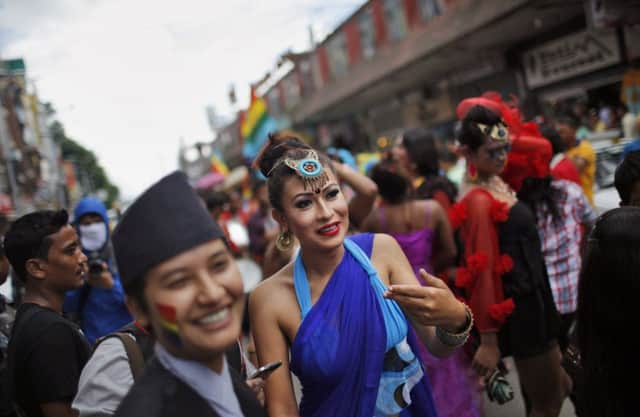Gay pride on the march in Nepal


The colourful rally in downtown Kathmandu – an annual affair – drew about 500 participants.
Pinky Gurung, head of the Blue Diamond Society, a gay rights group said, “The main aim of our rally this year is in memory of the thousands of people killed in the April earthquake, and to pray for the peace of these souls.
Advertisement
Hide AdAdvertisement
Hide Ad“But our main demand is that the rights of sexual minorities should be guaranteed in the new constitution.”
They are also demanding same-sex marriage be guaranteed in the new constitution, permitting gay and lesbian couples the right to adopt, buy joint property, open joint bank accounts and inherit from one another.
Nepal this year issued passports under the category “others” for those who do not want to be identified as male or female.
The country first recognised and allowed for applicants to identify as third gender in the census and citizenship card in 2011.
India, Australia and New Zealand are known to also allow applicants to list their gender as neither male nor female.
But the community has said only a few have been issued and it is still difficult to get them from government offices.
The parade has been held annually for the past few years on Gaijatra, a Hindu festival to remember the dead.
The much-delayed constitution draft is being finalised by members of the Constituent Assembly, but political parties are still unable to agree on the number and border of the proposed federal states.
Advertisement
Hide AdAdvertisement
Hide AdNepal decriminalised homosexuality in 2007 but it remains illegal in much of South Asia.
Minority ethnic groups have also argued that the new constitution, which would divide the country into seven federal states, enshrines discrimination against them and gives them insufficient autonomy.
The Gaijatra celebrations yesterday saw residents of Kathmandu mark the memory of the 9,000 who died in the devastating earthquake.
It is the first major festival since the April disaster.
Families who lost relatives in the past 12 months joined the ‘jatra’ or procession with a cow. Those who don’t have cows substituted a young boy dressed as one or with traditional costumes.
“The festival symbolises a ‘coming out of grief’ which gives the strength to deal with death in the family and move on.” said Sarad Pradhan of the Nepal Tourism Board.
One participant Binod Shahi, who lost his three daughters in the earthquake, said: “It is a sad feeling to be taking part in the festival, but I hope it will grant peace to the souls of my daughters and give us strength to cope.”
According to the Hindustan Times, it is said King Pratap Malla started the festival in 17th century to make his queen come out of her grief after losing her infant son.
The paper said it was also a platform for participants dressed in costumes to mock the royalty and use comedy to highlight social issues. The procession is said to have made the queen smile and it continued.